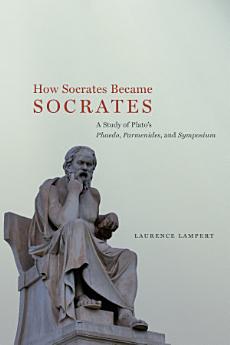How Socrates Became Socrates: A Study of Plato’s Phaedo, Parmenides, and Symposium
Mar 2021 · University of Chicago Press
Ebook
246
Pages
family_home
Eligible
info
reportRatings and reviews aren’t verified Learn More
About this ebook
Plato dispersed his account of how Socrates became Socrates across three dialogues. Thus, Plato rendered his becoming discoverable only to readers truly invested. In How Socrates Became Socrates, Laurence Lampert recognizes the path of Plato’s strides and guides us through the true account of Socrates’ becoming. He divulges how and why Plato ordered his Phaedo, Parmenides, and Symposium chronologically to give readers access to Socrates’ development on philosophy’s fundamental questions of being and knowing.
In addition to a careful and precise analysis of Plato’s Phaedo,Parmenides, and Symposium, Lampert shows that properly entwined, Plato’s three dialogues fuse to portray a young thinker entering philosophy’s true radical power. Lampert reveals why this radicality needed to be guarded and places this discussion within the greater scheme of the politics of philosophy.
In addition to a careful and precise analysis of Plato’s Phaedo,Parmenides, and Symposium, Lampert shows that properly entwined, Plato’s three dialogues fuse to portray a young thinker entering philosophy’s true radical power. Lampert reveals why this radicality needed to be guarded and places this discussion within the greater scheme of the politics of philosophy.
About the author
Laurence Lampert is professor emeritus of philosophy from Indiana University—Purdue University Indianapolis. He has published several books including Leo Strauss and Nietzsche, How Philosophy Became Socratic: A Study of Plato’s “Protagoras,” “Charmides,” and “Republic,”The Enduring Importance of Leo Strauss, and What a Philosopher Is: Becoming Nietzsche, all with the University of Chicago Press.
Rate this ebook
Tell us what you think.
Reading information
Smartphones and tablets
Install the Google Play Books app for Android and iPad/iPhone. It syncs automatically with your account and allows you to read online or offline wherever you are.
Laptops and computers
You can listen to audiobooks purchased on Google Play using your computer's web browser.
eReaders and other devices
To read on e-ink devices like Kobo eReaders, you'll need to download a file and transfer it to your device. Follow the detailed Help Center instructions to transfer the files to supported eReaders.






